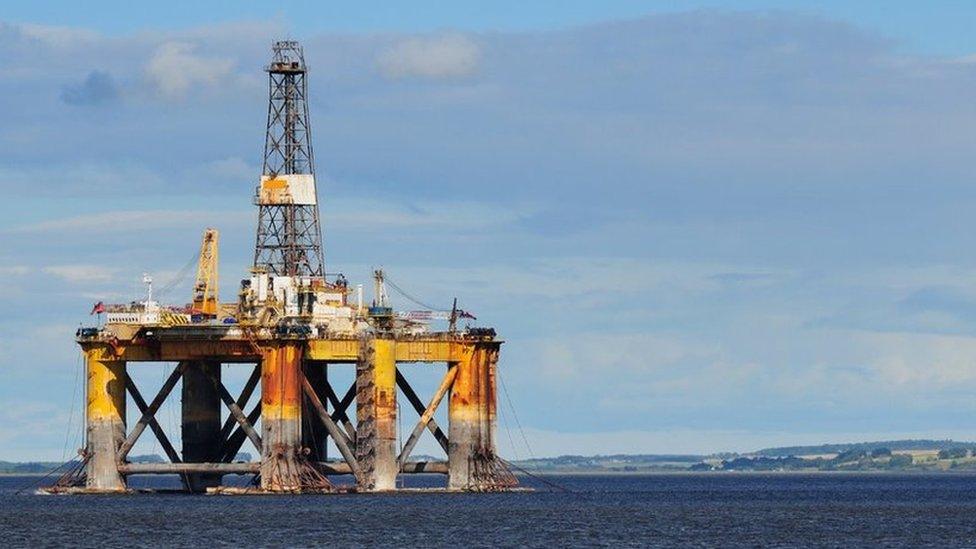Energy firms warn of UK oil and gas dependency
- Published
- comments
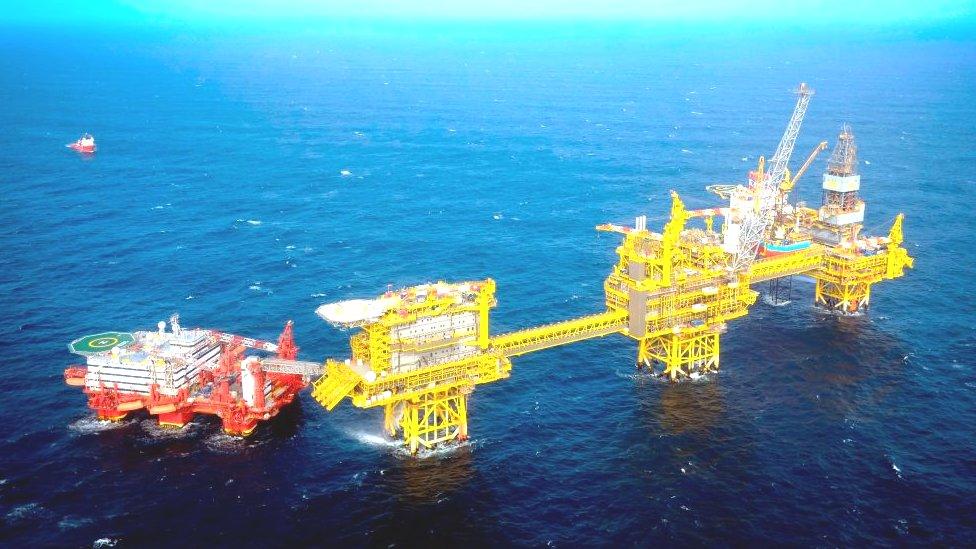
The industry body is warning of uncertainty about the future of North Sea oil and gas
The UK could be wholly dependent on imports of oil and gas within 15 years without political backing, the industry body has warned.
Ten major oil and gas projects worth up to £3.5bn are close to starting.
But Offshore Energies UK (OEUK), which represents the oil and gas industry, is warning about a lack of government commitment to the industry's future.
It comes amid pressure for greener energy solutions and calls for a windfall profits tax on producers.
OEUK says there could be import dependency by 2037 without the confidence to invest in the next year.
But with more commitment to the industry, and if prices hold up, the decline in output from UK waters could be limited to 5% per year, it suggests.
The message, issued in OEUK's annual business outlook, is aimed at the UK government which is drawing up an energy security strategy, with publication delayed probably until next week.
Deirdre Michie, the trade body's chief executive, says that energy security had become a matter of national security - with Russia's invasion of Ukraine, and with European countries eager to replace their dependence on Russian oil and gas.
The UK government has said energy security is its "absolute priority".
The Scottish government has shifted its energy policy towards a strong bias for renewables, while the SNP backs a windfall tax if it is spread across other highly profitable companies.
Green MSPs are partners in the Holyrood administration and want to see an end to drilling for oil and gas.
The party's energy spokeswoman Maggie Chapman said UK government funding should instead be directed "to develop Scotland's huge renewable energy potential".
The Labour Party has called for a windfall tax on oil and gas producers, to help offset the cost-of-living crisis.

Deirdre Michie believes energy security has become a matter of national security
OEUK wants to see cross-party support for the industry, and from different layers of government.
Last year, the UK sourced 43% of its demand for natural gas from its own waters and 32% of its oil consumption.
In an exceptional year due to Covid, that was significantly down in volumes produced but slightly higher as a share of demand than the trend over the past two decades, when production has been in decline.
OEUK reports that, for the first time, another country - Norway - has become the main source of Britain's gas supply, outstripping UK supply to the British market during last year.
Production in UK waters was 20% down during 2021, partly due to the Forties Pipeline Network - which gathers much of the oil from the central North Sea for pumping to Grangemouth refinery - being closed for several weeks of maintenance work.
OEUK's business outlook forecasts that two-thirds of the nation's energy needs in the next 15 years will be oil and gas.
But it says that without new investment in the next 15 months, production will be down to between 20% and 30% of UK demand by the end of this decade, and largely wound down within 15 years.
Political disagreements
With the right political commitment seen as being as important to investment decisions as the prices for oil and gas, OEUK says the decline in output could be limited to 5% per year.
That would include support for drilling for new reserves from exceptionally low levels in the past two years.
The industry is also looking for a new licensing round this year, allowing oil and gas firms to drill in new areas.
According to the OEUK report: "Investment in the oil and gas sector has fallen from about £16bn/year in 2014 to £5.5bn in 2019 and a predicted £4bn this year.
"The causes are varied but the UK's complex regulatory environment, plus the political disagreements around issues like climate change and windfall taxes are all factors deterring investment."
Ross Dornan, the OEUK market intelligence officer, said: "About 75% of the UK's total energy comes from oil and gas - about 2% up on last year. That is because 80% of our homes are heated by gas which is also used to make 42% of our electricity. We also have 32 million vehicles that rely on petrol and diesel.
"The energy gap between what we produce ourselves and that which comes from other nations will keep growing unless we invest in exploration and production on the UK's continental shelf.
"We must also accelerate the development of cleaner energy like hydrogen. Investment now will give us energy security in the years to come."
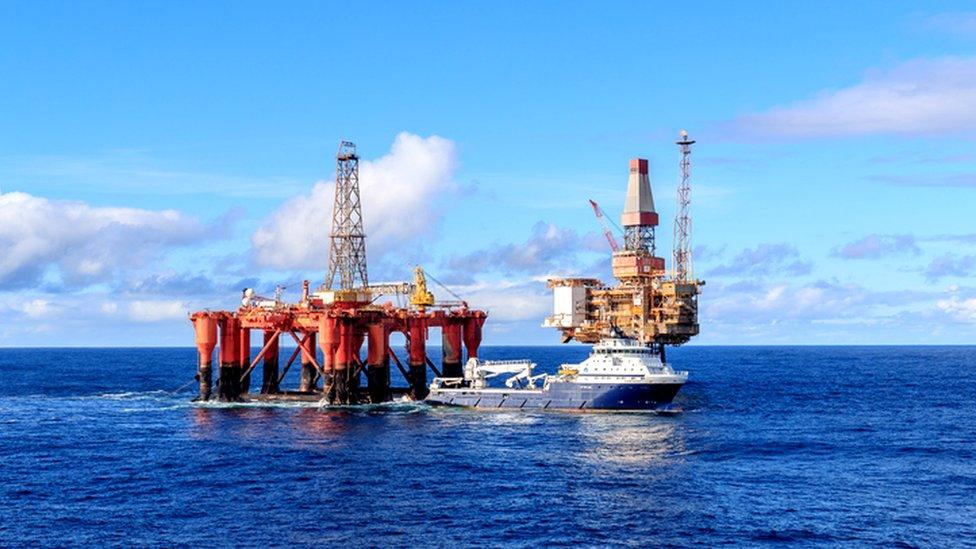
Investment in the sector has fallen by nearly £10bn since 2014
The trade organisation's projections of future investment also reflect a shift to renewable power. OEUK recently changed its name from Oil and Gas UK, and emphasises the opportunity for those with offshore hydrocarbon experience to adapt to business opportunities in offshore wind and marine generation.
It says there could be as much as £250bn invested in offshore energy this decade. While two-thirds of that is currently focused on oil and gas, that is on course to shift to 80% low-carbon energy, including carbon capture and storage, as well as hydrogen.
Some of that investment is aimed at reducing the intensive use of gas-burning to pump and process oil and gas. OEUK suggests that as much as a tenth of its output could be redirected to supplying the British gas grid if it is replaced on offshore oil and gas installations by electricity from floating wind turbines.
Nuclear capacity
A UK government spokesman said energy security "is our absolute priority".
He added: "This is why, as part of our North Sea Transition Deal, we have committed joint investment with industry of up to £16bn by 2030 to maintain security of supply while boosting hydrogen production, carbon capture and other technologies to cut emissions.
"We cannot turn off North Sea oil and gas overnight as doing so would put energy security, British jobs and industries at risk, and we would be even more dependent on foreign imports.
"Our energy supply strategy will look at all options to bolster the UK's energy security for the long term, by continuing to back our vital North Sea oil and gas sector while at the same time supercharging our renewable energy and nuclear capacity."
Scottish Greens spokeswoman Maggie Chapman called on the UK government to hit energy companies with a windfall tax, and "not give them carte blanche to continue wrecking the planet and fleecing their customers".
She added: "The oil and gas industry spent decades denying the climate crisis, and now they are simply ignoring it by attempting to double down on fossil fuel extraction.
"Rather than invest in more oil and gas, that funding should be directed to develop Scotland's huge renewable energy potential and focus on reducing demand through retrofitting and insulation schemes, which are the best ways to secure our energy supply and keep household costs down."
Related topics
- Published10 March 2022
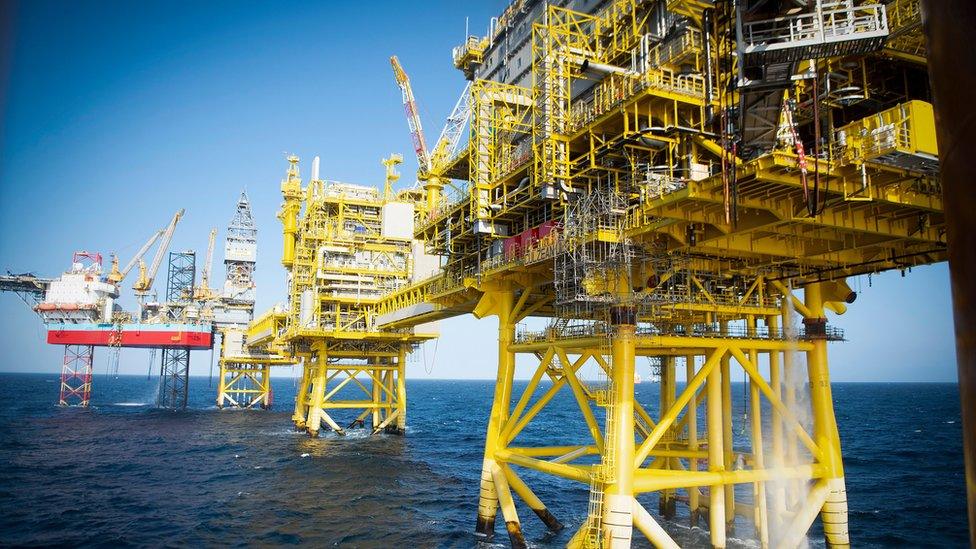
- Published8 February 2022
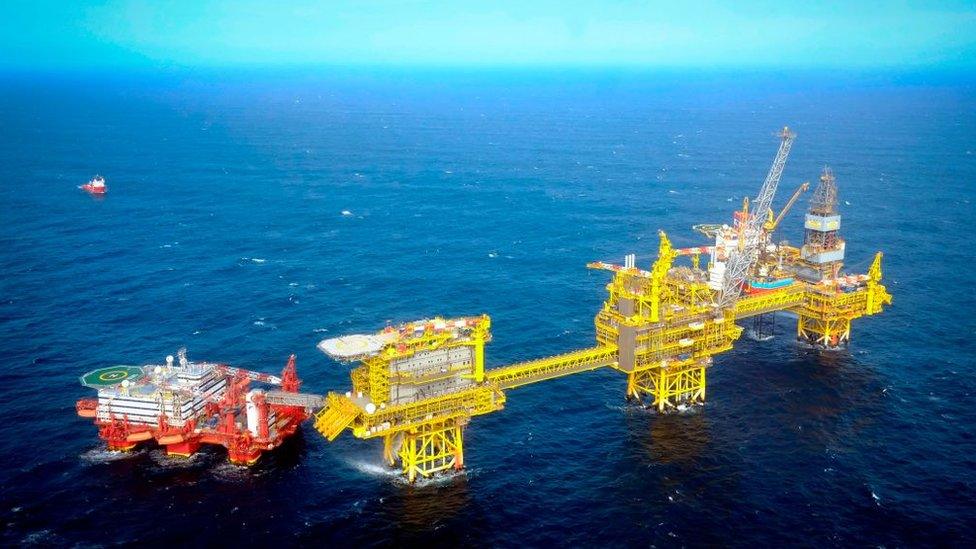
- Published3 November 2021
